#hurricane ida recovery
Photo

Consultation Service for Damage Claims from Hurricane IDA
If Hurricane Ida caused damage to your house, it is important to file a claim covered by your insurance. We are here to help policyholders if insurer improperly delays, rejects, or underpays an insurance claim. Contact us today.
0 notes
Text
Katrina Survivors Were Told They Could Use Grant Money to Rebuild. Now They’re Being Sued for It.
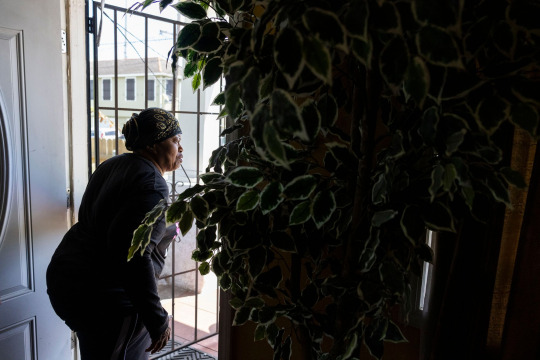
After Hurricane Katrina, struggling homeowners said, they were told not to worry about the fine print when they received grants to elevate their homes. Now the state is going after them because they did exactly that.
This article was produced for ProPublica’s Local Reporting Network in partnership with The Advocate | The Times-Picayune, and it was also co-published with WWL-TV. Sign up for Dispatches to get stories like this one as soon as they are published.
As natural disasters become more expensive, ProPublica and The Advocate | The Times-Picayune are investigating how relief programs unintentionally punish poor people. Do you have a story to tell? Fill out this form.
Celeste Matthews spent last summer’s 16th anniversary of Hurricane Katrina in a panic at her cousin’s house in Uptown New Orleans as another monster storm, Hurricane Ida, roared through the city. With every gust, she was terrified the windows would shatter.
The next day, she returned to her home in the Gert Town neighborhood to find part of the roof torn off. With the electricity out, she had to sleep with the windows open. Mosquitoes swarmed around her bed.
“It was horrible,” said Matthews, 67.
After three days without power, Matthews had her daughter drive her to Houston. A week later she returned home, closed the curtains and sank into a depression, spending the next several days in bed.
One morning, she awoke to a knock on the door. An Orleans Parish sheriff’s deputy was holding a stack of court papers. Matthews, her hands shaking, read the first page:
“State of Louisiana, Division of Administration, Office of Community Development - Disaster Recovery Unit Versus Matthews, Celeste.”
Below that: “YOU HAVE BEEN SUED.”
When the levees broke during Katrina in 2005, Matthews’ home was engulfed in 5 feet of water. She lost everything. Like most poor New Orleanians, she struggled to cobble together enough money to rebuild.
In 2008, the state of Louisiana offered Matthews $30,000 through the federally funded Road Home program to elevate her house to reduce the risk of future flooding. But her home was still unlivable, and she desperately needed the cash for repairs. To her relief, she said, a Road Home representative told her she could use the elevation grant to instead pay for repairs. So she did.
Now, more than a decade later, the state wanted the money back.
Louisiana has sued about 3,500 people — about one in every nine people who received an elevation grant — for failing to use the grants to raise their homes after hurricanes Katrina and Rita struck in 2005.
The real problem, however, wasn’t that people ignored the rules, according to an investigation by The Advocate | The Times-Picayune, WWL-TV and ProPublica. It’s that the state Office of Community Development and a contractor it hired in 2006, ICF Emergency Management Services, mismanaged the program. For more than a decade since, the U.S. Department of Housing and Urban Development has insisted that the state recoup the money from people who are noncompliant.

Louisiana gave money to 32,000 homeowners starting in 2008. The state was in such a rush to distribute grants that no one verified they were eligible, according to the testimony of a top state official in one of the lawsuits. Some homeowners, like Matthews, said Road Home representatives told them they could use the money for repairs, even though that would violate their grant agreements.
Twice between 2013 and 2015, the state tried to fix the problem, changing the rules to allow spending on repairs and other expenses. But by then, so much time had passed that many homeowners couldn’t prove how they had used the money.
Some homeowners said they originally planned to elevate, but found that $30,000, the typical elevation grant, was less than a third of what it typically costs to lift a house and put it onto raised footings.
In 2017, under pressure from the federal government to recoup the funds, Louisiana started filing lawsuits against residents.
For many low-income homeowners, the suits could threaten financial ruin. Several pre-emptively declared bankruptcy, according to their attorneys. Others failed to defend themselves in court, resulting in the state placing liens on their properties. Some fear their homes will be taken away.
“We worked our asses off to get where we are now,” said Michelle Williams, 54, who is being sued along with her husband, Patrick Williams. “And for this to happen? You’re not helping the people of Louisiana. You’re knocking us farther and farther back.”
If they lose the lawsuit, she said, “I will crumble.”
The failures of Louisiana’s elevation grant program are part of a tapestry of dysfunction in how America prepares for disasters and helps victims in their wake. ProPublica and The Advocate | The Times-Picayune are exploring how a range of policies unintentionally punish working-class Americans and people of color, contributing to the disproportionate harm they suffer in catastrophes.
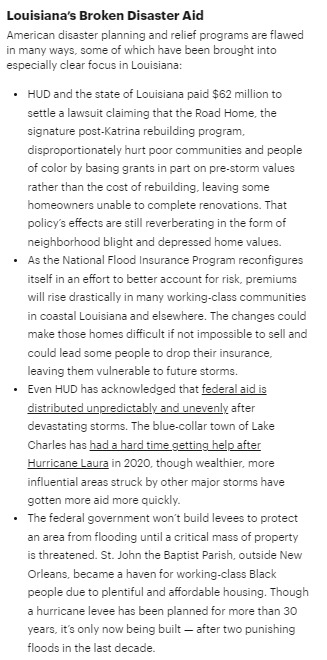
The problem is particularly urgent in Louisiana. Not only is it one of the poorest states in the union, it’s the most flood-prone, and it has been struck by some of the costliest natural disasters ever to hit the U.S. Thanks to global warming, the severity of such events is increasing, and their monetary toll is skyrocketing: Adjusted for inflation, the cost of U.S. natural disasters has increased by 600% since 1980.
The lawsuits over elevation grants, which have left thousands of Louisiana homeowners facing the prospect of cripping liens or payment plans, are part of the broader pattern of poor disaster planning.
The majority of elevation grants were in lower-income neighborhoods and communities of color, as were the lawsuits that followed, according to an analysis by ProPublica and The Advocate | The Times-Picayune. For the roughly 3,000 lawsuits that could be mapped, more than half of properties were located in census tracts with median incomes below the surrounding areas.
Roughly two-thirds of the properties were in neighborhoods that were disproportionately Black compared to their parishes.
The state is seeking $103 million in the elevation lawsuits. So far it has recovered nearly 5% of that from 425 families through the suits, said Pat Forbes, executive director of the Office of Community Development.
The agency tried to avoid taking such an aggressive approach, he said. But the state is required by the federal government to claw back money from people who didn’t follow the grant requirements.
“We’ve gone to great lengths to try to not have to take money back from people,” Forbes said, adding that the state will not foreclose on anyone’s home to collect.
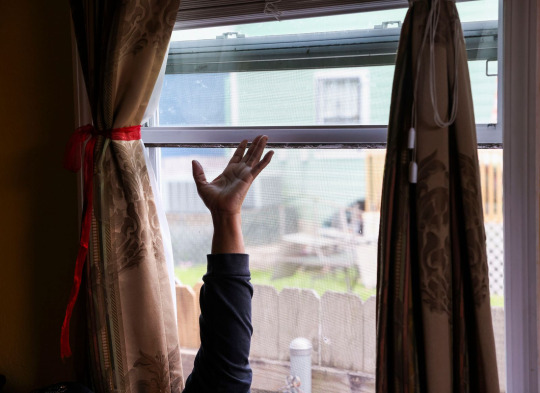
A HUD spokesperson said the state could have used its own funds to repay any misspent grants rather than going after homeowners.
Suing them years later runs counter to the goal of helping the devastated communities of Louisiana rebuild, said U.S. Rep. Troy Carter, D-La.
Carter said he and other officials have talked to the Biden administration and Gov. John Bel Edwards about wiping the slate clean.
“These are not people that defrauded the government,” Carter said. “These are people that used the money to repair their homes. And they should not be put in a position where now those homes are being threatened.”
“I Wish I Never Signed That Paper”
Donnie Small’s family has deep ties to Jefferson Parish, which borders New Orleans. His father was the first Black sheriff’s deputy in the parish. Small drove a public bus there for 37 years.
After Katrina, Small volunteered to shuttle first responders between a small town upriver and New Orleans, 29 miles every morning and night. He did so when his own family was suffering, like so many others.
The one-story house in Kenner that he shared with his wife and two daughters sat in 2 feet of water for days after the storm. Everything had to be replaced: furniture, flooring, appliances, wiring.
Small, 69, received about $60,000 from his insurance company, but that covered only immediate needs, such as remediating mold and removing damaged trees. Unable to afford other accommodations, his family slept on air mattresses in the gutted structure, wearing masks to keep out the dust.
Small didn’t know how he was going to come up with more money, but he refused to give up. “I’ve never had any intentions of moving anywhere else,” he said. “This is my home. I’m going to be here.”
The Road Home program, created in 2006 to help people rebuild, often gave people less money than they needed to complete repairs because of how awards were calculated.
So in 2008, when the state sent 40,000 letters to homeowners telling them they were eligible for elevation grants, plenty of them were interested.
“The State of Louisiana is pleased to announce that funds are now available to assist you with the cost of elevating your home,” the letters read. To get the money, homeowners had to agree to raise their homes within three years of receiving grants.
Yet when Small met with a Road Home representative, he said, he was told he could put his $30,000 grant toward repairs. The money was a godsend, Small said.
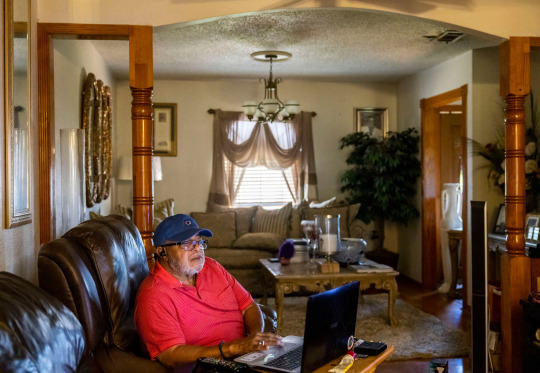
Once the state Office of Community Development received an application, it sent the money to homeowners, Jeff Haley, who helped administer the elevation grant program as an official with ICF from 2006 to 2009, said in testimony during one of the elevation lawsuits.
No one double-checked before the money went out that homeowners were eligible or that their homes needed to be elevated, said Haley, who is now with the state Division of Administration. The state simply “didn’t have time,” he said. There was pressure to “get the funds out into the community as fast as possible.”
The state told the news organizations that it selected people whose homes were in flood-prone areas and who had already received another Road Home grant. It was up to homeowners to determine how much they needed to elevate their homes, officials said, and if they learned they were already at the correct height, they should have returned the money.
But when homeowners informed Road Home representatives, sometimes in writing, that they didn’t plan to elevate their homes, they were verbally told that they could use the money for repairs, according to eight families and eight attorneys representing more than 200 homeowners.
State officials told the news organizations no homeowners have identified who told them they could use the money for repairs. They suggested this didn’t happen until years later, after the state changed the rules to allow people who hadn’t raised their homes to use elevation grants for repairs.
Small said he never would’ve accepted the money if he hadn’t been told he could use it to fix his home.
“Back then it seemed they were really trying to help people,” said Small, who is the subject of a pending lawsuit. “We thought it was something that was a plus for us, that we can get our home back to the position that it was before the storm. Now, I wish I never signed that paper.”
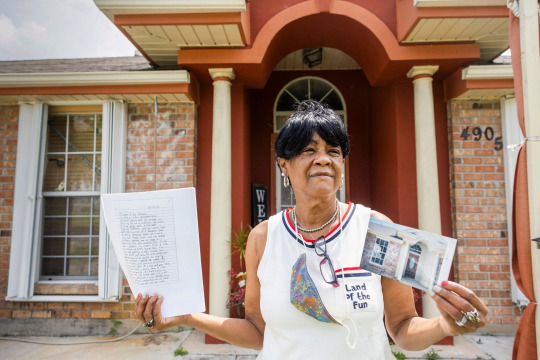
12 notes
·
View notes
Text
10.29.22 Headlines
WORLD NEWS
The Philippines: 50 dead, dozens feared missing in storm (AP)
“Flash floods and landslides set off by torrential rains left at least 50 people dead, including in a hard-hit southern Philippine province, where as many as 60 villagers are feared missing and buried in a huge mudslide laden with rocks, trees and debris, officials said Saturday.”
Somalia: Two explosions rock capital, leaving scores dead (AP)
“Two car bombs exploded Saturday at a busy junction in Somalia’s capital near key government offices, leaving “scores of civilian casualties” including children, national police said. The attack came five years after a massive blast at the same location.”
South Korea: Dozens in cardiac arrest after Seoul crowd surge (AP)
“South Korean officials say dozens of people were in cardiac arrest after being crushed by a large crowd pushing forward on a narrow street during Halloween festivities in the capital Seoul. Choi Cheon-sik, an official from the National Fire Agency, said around 100 people were reported as injured during the crowd surge Saturday night in the Itaewon leisure district.”
US NEWS
Pelosi Attack: Country on edge about democracy threats (AP)
“An America that can already feel like it’s hurtling toward political disintegration has been jolted yet again, this time by the violent attack on the husband of House Speaker Nancy Pelosi less than two weeks before Election Day. Seizing a hammer and leaving a trail of broken glass, an intruder broke into the couple’s San Francisco home early Friday and repeatedly struck Paul Pelosi, 82. He had surgery to repair a skull fracture and serious injuries to his right arm and hands, and his doctors expect a full recovery, the speaker’s office said.”
FEMA: US storm survivors - ‘We need faster money, less red tape” (AP)
“Survivors of storms that pounded several U.S. states say the nation’s disaster aid system is broken and want reforms to get money into victims’ hands faster, with less red tape. On the 10th anniversary of Superstorm Sandy’s landfall at the Jersey Shore, devastating communities throughout the northeast, survivors will gather Saturday with others who went through hurricanes Harvey, Irma, Maria and Ida along with victim advocacy groups from New Jersey, Florida, Texas, Louisiana and Puerto Rico.”
Guantanamo Bay: US releases oldest detainee Saifullah Paracha (BBC)
“Guantanamo Bay's oldest prisoner has been released to his home country, Pakistan, after almost two decades. Saifullah Paracha, 75, was arrested two years after the 11 September 2001 attacks on the US and accused of being an al-Qaeda sympathiser. Mr Paracha was suspected of financing the jihadist group, but maintained his innocence and was never charged. The US military prison in Cuba once housed hundreds of suspected militants captured following the attacks.”
#current events#news#philippines#floods#weather#global warming#climate change#natural disaster#climate crisis#somalia#south korea#terrorism#united states#paul pelosi#nancy pelosi#politics#fema#guantanamo bay
5 notes
·
View notes
Text
0 notes
Text
Extreme Republican Shutdown Would Delay Nearly 2,000 Long-Term Disaster Recovery ...
In New Jersey, millions of dollars meant to help rebuild a senior citizen building following Hurricane Ida would remain frozen. And in Florida …
View On WordPress
0 notes
Text
Day 28- A picture of you last year and now, how have you changed since then?


The first photo of me was in Charlotte, North Carolina in August 2021. I was visiting two good friends and their baby daughter, who was about two months old at the time. On that day that photo was taken, my friends and I enjoyed a warm summer's day hanging out at an old red brick warehouse complex that had been converted into a hip, art collective-esque space with cafes, galleries, and a traveling Van Gough exhibit. I daydreamed, listened to A Tribe Called Quest that was reverberating from some nearby speakers, looked up at the clouds, and watched my friends interact with their baby daughter; it was probably the first moment I recall that I was viscerally inspired to become a parent myself one day in the future. Later, we drove around downtown Charlotte before finding a quiet community park tucked away in the city, where my friend and I walked around the baseball field and his wife nursed the baby in the car as a rainstorm was approaching. As my friend and I walked back to the car we ended up getting caught in the rain for a bit. I asked him to take a portrait of me in the parking lot to commemorate the moment once the rain let up. We had smoked turkey, beef brisket, baby back ribs, hushpuppies, and cold beers for dinner before returning back home for the night.
I often think about how my life might have turned out differently if I had decided to take shelter with these friends in North Carolina instead of going to Texas when I had to evacuate New Orleans from Hurricane Ida only a few weeks later. I probably would not have been living as recklessly and wildly as I had been in Austin or Dallas, since I would have been in a more stable, domestic household than couch surfing with my other bachelor friends. Even though a lot of the food options in both North Carolina and Texas are not too dissimilar, I would probably still have been eating more wholesome, nutritious home-cooked foods if I had been taking shelter in Charlotte. Realistically, I also would not have been exposed to as many people there compared to either Austin or Dallas too. But a lot of that type of thinking is just a never-ending rabbit hole of hypothetical "what-ifs." I have since made peace with the realization that I made a serious of poor, irrevocable decisions with my health and well-being during my "evacuation vacation" in Texas that proved to be my downfall. And that is a lesson I have to live with for the rest of my life going forward.
The second photo of me was taken at Scripps Pier in La Jolla, California, about three months after I had been discharged from the hospital in San Diego following my double lung transplant. In about the year since these two photos were taken, I was hospitalized in three different states, lost my father, survived 165 days on ECMO treatment, received my double lung transplant surgery, began playing more video games and watching more movies and television series, reconnected with formerly estranged friends and family, lost 45 pounds from being in the hospital, regained almost 30 pounds since getting out, released a full-length album with my folk rock band, began a lifelong medication regiment as a transplant recipient, and underwent a surgical procedure to remove a polyp from above my vocal cord and seal up the hole in my neck from my trach tube.
Life as I knew it before feels like a distant memory—finishing my first year of graduate school in New Orleans, playing music and performing at gigs with my band, bicycling around and exercising at Audubon Park, smoking a joint and enjoying a cold beer, hiking through the mountains and swimming at the beaches in Hawaii, beginning in person classes for my second year of graduate school, and working towards completing my master's thesis in musicology. Now, I have had to put my studies on hold to take a medical leave of absence and I am still in full-time recovery in San Diego, living with my mom and grandma. I have recently resumed writing tutoring and coaching UCSD's mock trial program in my spare time. I do miss regularly playing music with other musicians; playing my instruments by myself without going busking or collaborating with other creatives does not hold the same appeal anymore. I have been sober from any recreational drugs and alcohol for over a full year by now, and I intend to keep it that way until the one year anniversary of my transplant surgery, after which I will decide to what extent I want to reintroduce any substances back into my life. Maybe I will find that I am better off without any of them.
The one thing that has not necessarily changed but has substantially deepened has been my belief and faith in God and Jesus Christ. I do not know how an inveterate atheist or someone who denies the existence of a higher power could have survived the ordeal that I went through, both from a mental fortitude perspective and also the circumstances and timing surrounding the events that transpired throughout my extended hospitalization and leading up to my surgery, over which I had absolutely no control or influence over. I cannot simply dismiss the miracle of my survival as a random, chaotic coincidence that I could probably do all over again and yield the same favorable results based on another spin of the cosmic lottery wheel.
A good friend of mine told me that even though a lot of my life circumstances might have changed, he did not see me as any different than the Kyle that he knew before. I might have added new layers to who I currently am based on what I have been through, but at the end of the day, he still saw me as the same person who is constantly growing and evolving into who I am today. That was encouraging to hear for me when I was still in the hospital, since I felt like a helpless shell of a human being for so long, at the mercy of the medical staff and God at all times. But just to be alive today is a miracle in itself and the rest of the journey is still waiting to be continued.
0 notes
Text
Rehab After Hurricane Ida Hampered by Scarcity Of Roofers - Top Line
Rehab After Hurricane Ida Hampered by Scarcity Of Roofers – Top Line
More assistance is desperately needed by construction companies in the South.
In some of the hardest-hit places this hurricane season, such as Louisiana and Texas, a nationwide scarcity of trained labor is hampering recovery. Contractors in the area say they’re struggling to keep up with the demand.
“People rely on us,” Allen Gautreaux, the manager of Ameristar Roofing in Houma, Louisiana,…
View On WordPress
0 notes
Text
Assisting New Yorkers Impacted by Hurricane Ida
Assisting New Yorkers Impacted by Hurricane Ida
Photo: FleurDeOdile, Public domain, via Wikimedia Commons
Comes One Year After Hurricane Ida Made Landfall in New York
Public Comment Period Now Open for Recovery Grants to Enhance Resiliency
Hearings To Be Held on September 8 and September 13
Governor Kathy Hochul today announced the release of the proposed Action Plan by the Governor’s Office of Storm Recovery to recover from Hurricane Ida,…
View On WordPress
0 notes
Video
In North America, the Bulk Helium Price were soaring in the fourth quarter of 2021, backed by robust demand from the downstream industries. Furthermore, depleting Helium reserves in the US, diminished the supply and worsened the situation. In addition, as the industries were in the recovery phase after the hazardous impacts of Hurricane Ida, the rate of supply was sluggish. Altogether, firm demand from the automotive, aircraft, and healthcare industry surged the price value of bulk Helium, further supported by reduced supply. However, depleting Helium reserves are threatening future supply of the product in the global market.
0 notes
Photo

Attroney Storm Damage Claim
Need an attorney for hurricane insurance claim? Get in touch with The Voorhies Law Firm. All of your rights to recovery will be reviewed and preserved by our IDA help lawyers as part of our service. Contact us today.
0 notes
Text
Update: Seems like Hurricane Ida did minimal damage to my hometown, but the southeastern part of the state was shredded.
So, some words on charity after the storm:
Don't donate to the Red Cross. They were among the only people on the ground after Katrina, but they kind of messed that up.
If you feel like donating, it's always best to donate straight to those in need. Just go to your charity site of choice, find someone, and give.
NOLA has a huge LGBTQPIA population, and they're gonna need help.
60% of the city is BlPOC. A lot of the rural areas around NOLA are mostly BlPOC.
Please donate to the people of rural Louisiana and Mississippi! They will get almost no media coverage, and the emergency response to rural places will be negligible.
The train yard towns of Livonia and Avondale are Black areas. Ascension Parish (we don't have counties, y'all) is largely Black.
And poor. NOLA and all the other places that were devastated by this storm are so poor, y'all. Everybody's poor.
This is the worst time of the month for something like this to happen. Payday is after the first. SSI and SSDI pay out on the first. SNAP benefits credit in the first week of the month.
We. Are. All. Broke.
People are going to be hurting. FEMA response is expected to be better than Katrina. But people are still going to be hurting.
Don't donate stuff unless it's specifically asked for by a certain person and you are placing it into that person's hands. Lots of clothes rotted in the street after Katrina because nobody asked what people needed.
Never assume. Ask.
Money is literally the best thing to donate. Not through an org, but directly into the hands of those in need.
Thoughts and prayers are nice, and we like them. But they don't buy diapers, TBH.
Thanks in advance, y'all. Recovery is going to be slow, and my state is gonna need every ounce of help.
3 notes
·
View notes
Text
So, don’t know if everyone watches the news, but my area was just devastated by Hurricane Ida. I personally have been flooded in and cut off from civilization and my family have all lost our cars. We are trying to get donations of food, water, tarps and anything else that may help. We are also under heat advisory and May not have power back til October.

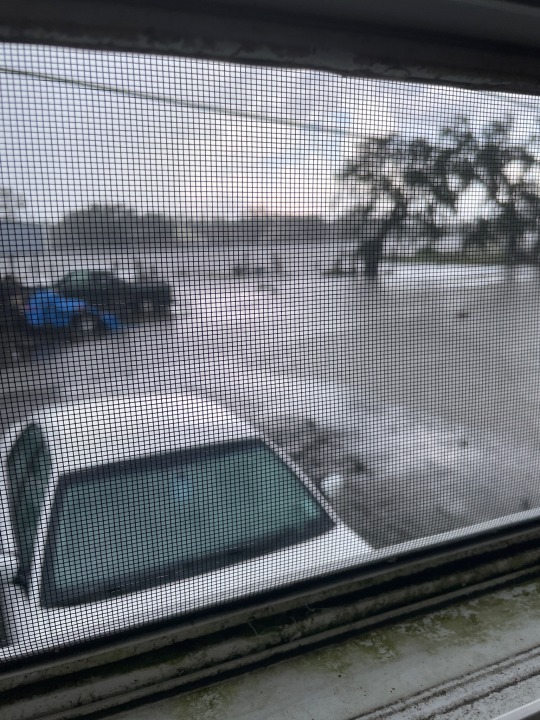


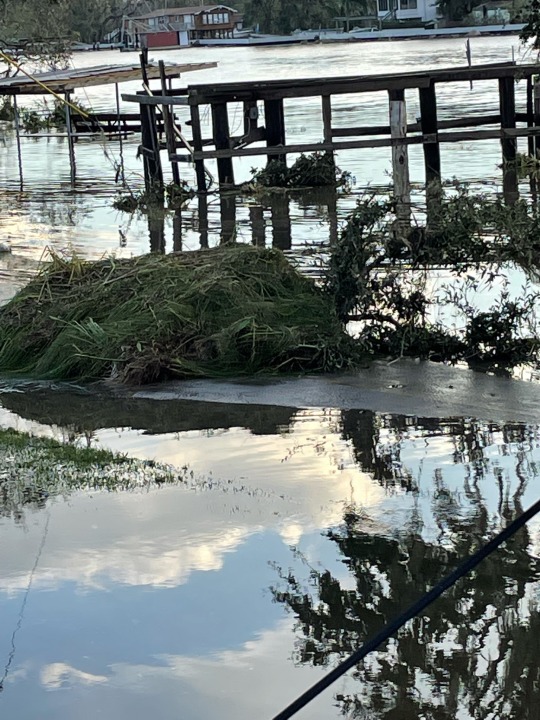

12 notes
·
View notes
Text
We have power back!
Now, I’m waiting (impatiently) for WiFi.
#hurricane ida#the recovery#electricity has never felt so sweet#I NEED my WiFi but the lines were destroyed
3 notes
·
View notes
Link

Now that Hurricane Ida has subsided, the hard and arduous clean-up and rebuilding work begin. As a category 4 hurricane, Ida swept through large portions of the United States, hitting the Gulf Coast and the East Coast.
#small business#small business owners#hurricane ida#recovery resources#damage caused by a hurricane#homeowners#disaster#hurricane
0 notes
Link

Now that Hurricane Ida has subsided, the hard and arduous clean-up and rebuilding work begin. As a category 4 hurricane, Ida swept through large portions of the United States, hitting the Gulf Coast and the East Coast.
#small business#small business owners#hurricane ida#recovery resources#damage caused by a hurricane#homeowners#disaster#hurricane
0 notes
Link
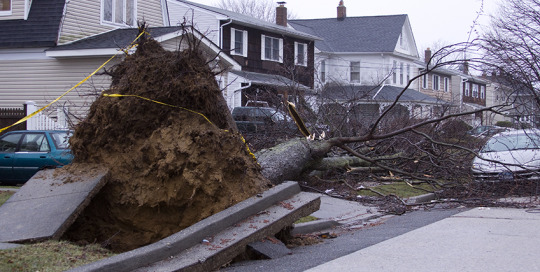
Now that Hurricane Ida has subsided, the hard and arduous clean-up and rebuilding work begin. As a category 4 hurricane, Ida swept through large portions of the United States, hitting the Gulf Coast and the East Coast.
#small business#small business owners#hurricane ida#recovery resources#damage caused by a hurricane#homeowners#disaster#hurricane
0 notes